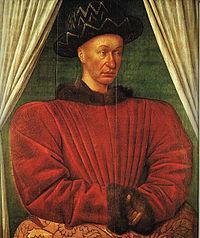Charles VII of France Royalty
Charles VII (22 February 1403 – 22 July 1461), called the Victorious (French: le Victorieux) or the Well-Served (French: le Bien-Servi), was a monarch of the House of Valois who ruled as King of France from 1422 to his death, although his legitimacy was initially contested by Henry VI of England.In 1422, Charles VII inherited the throne of France under desperate circumstances. Forces of the Kingdom of England and Duke Philip III of Burgundy occupied Guyenne and northern France, including Paris, the most populous city, and Reims, the city in which the French kings were traditionally crowned. In addition, his father Charles VI the Mad had disinherited him in 1420 and recognized Henry V of England and his heirs as the legitimate successors of the French crown instead. At the same time, a civil war raged in France between the Armagnacs (supporters of the House of Valois) and the Burgundian party.With his court removed to Bourges, south of the Loire River, Charles was disparagingly called the “King of Bourges”, because the area around Bourges was one of the few remaining regions left to him. However, his political and military position improved dramatically with the emergence of Joan of Arc as a spiritual leader in France. Joan of Arc and other charismatic figures led French troops to several important victories that paved the way for the coronation of Charles VII in 1429 at Reims Cathedral. This long-awaited event boosted French morale as hostilities with England resumed. By 1453, the French had expelled the English from all their continental possessions except for the Pale of Calais. The last years of Charles VII were marked by conflicts with his turbulent son, the future Louis XI of France.
Search
Royalty
| From | 1422 |
|---|---|
| To | 1461 |
| predecessor | |
| successor |
